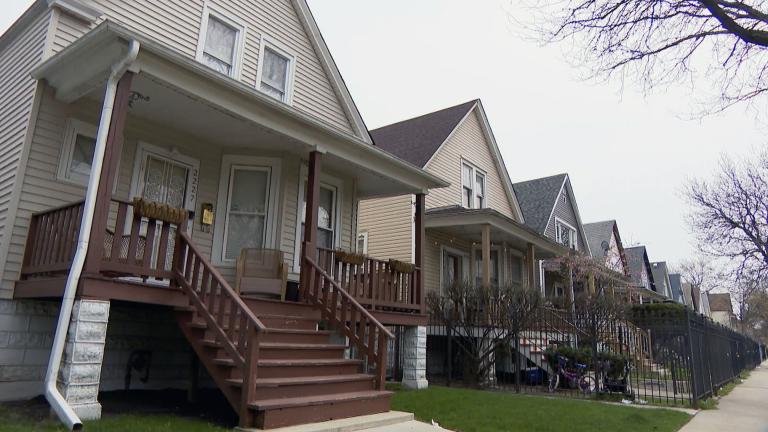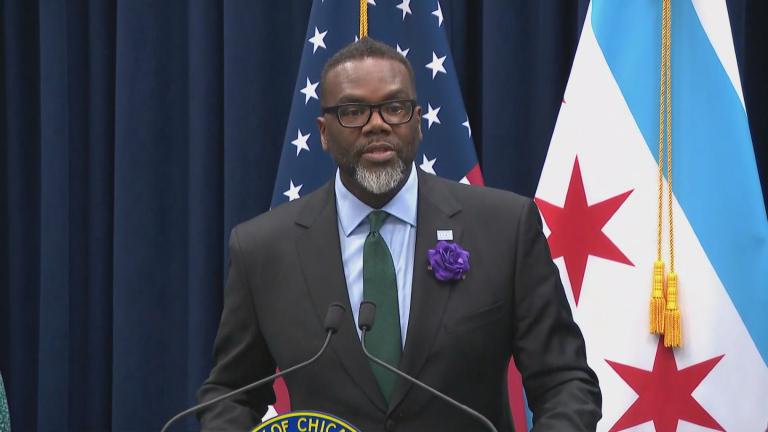The Chicago City Council approved Mayor Lori Lightfoot’s $16.4 billion 2023 spending plan on Monday after hours of debate that featured intense criticism — and tepid praise — of the plan put together by the mayor, who is seeking a second term.
The budget, which takes effect Jan. 1, 2023, approximately two months before Lightfoot is set to ask voters to make her the first woman to be re-elected as Chicago mayor, does not include a property tax hike to keep up with the soaring rate of inflation, or any other tax or fee hikes.
The final vote on the tax levy was 29-21. The budget itself passed 32-18.
That margin was surprisingly narrow for a budget designed to easily win the approval of the City Council, whose 50 members also face re-election in February — or retirement in May.
After the vote, Lightfoot delivered a campaign-style speech that touted her 2023 spending plan as the best way to build on what she says are her progressive accomplishments, even as spent nearly her entire term at odds with Chicago’s progressive political community.
Those who voted for the budget on Monday helped “right historic wrongs.”
Ald. Jason Ervin (27th Ward), the chair of the Black Caucus, said the 2023 spending plan was not perfect — but moved the city toward a more equitable future.
“We all want to go to heaven, but none of us want to die,” Ervin said.
Alds. Harry Osterman (48th Ward) and David Moore (17th Ward) — who voted for the budget — nevertheless blasted the mayor for failing to make good on promises to use nearly $2 billion in federal relief funds to strengthen the city’s tattered social safety net, as reported by WTTW News.
Chicago’s financial picture has been buoyed by the city’s red-hot real estate market, faster than expected recovery from the depth of the economic ravages of the COVID-19 pandemic and billions in federal aid. The 2023 budget deficit was the smallest since 2019, allowing Lightfoot to quickly drop a proposed property tax hike that became politically toxic.
Ten of the alderpeople who voted against the budget are among the most conservative members of the City Council, including Ald. Brendan Reilly (42nd Ward), who said he could not vote for a budget that did nothing to address the woes of the CTA, which he called a “dumpster fire” that was not reliable or safe to ride.
Ald. Tom Tunney (44th Ward) said he voted no because the Chicago Police Department has done nothing to stop surge in violent crime in his North Side ward that includes Wrigleyville.
“This department is fully funded, under motivated and not doing the job to keep the city safe,” said Tunney, who is weighing a run for mayor against Lightfoot, who appointed him as the chair of the City Council’s powerful Zoning Committee.
Ald. Raymond Lopez (15th Ward), who is running for mayor, also voted against the budget.
More conservative members of the City Council said they were disappointed the spending plan did not include more money to fill vacant positions in the Chicago Police Department — and keep officers from leaving. As part of Lightfoot’s proposal, the Chicago Police Department’s budget is set to increase by $64 million to a total of $1.94 billion. However, the department is only slated to add 35 positions.
However, the department is set to increase spending significantly on the number of officers assigned to patrol the CTA, with that budget jumping from $10.7 million in 2022 to $30 million in 2023. In recent months, a number of high-profile shootings and stabbings have grabbed headlines and led many Chicagoans to question whether it is safe to ride the CTA.
The interim commission that oversees the Chicago Police Department released an analysis on Thursday that found the department is not using its budget “effectively or equitably” because it lacks “a long-term, data-driven strategy to reduce violence.”
Eight of the alderpeople who voted against the budget are among the most progressive members of the City Council, including five members of the City Council’s Democratic Socialist caucus, and Ald. Sophia King (4th Ward) who is running for mayor.
However, Ald. Roderick Sawyer (6th Ward), who is also running for mayor, voted for the budget.
Ald. Carlos Ramirez Rosa (35th Ward), who blasted the mayor for failing to live up to her promise during the 2019 campaign to re-establish the department axed by former Mayor Rahm Emanuel for disbanding it as part of Chicago’s 2012 budget.
Lightfoot “made promise after promise after promise that would undo the harm that Rahm Emanuel caused ... and accomplished nothing,” Ramirez Rosa said.
Alds. Roberto Maldonado (26th Ward), Felix Cardona (31st Ward) and Debra Silverstein (50th Ward) voted against the city’s tax levy, but for the budget spending those tax dollars.
After the meeting, Lightfoot defended her refusal to create a Department of Environment, saying it would not be responsible.
Instead, Lightfoot’s spending plan creates an Office of Climate and Environmental Equity that will not be part of the mayor’s office as she originally proposed.
Lightfoot also agreed to increase the office’s size from six employees to 10 employees and boost its budget by more than 33% from the mayor’s initial proposal to $1.04 million, according to the spending plan approved Monday. A study will determine whether a full department is needed.
“Running (for office) is not governing,” Lightfoot said. “I’m responsible for the governance of this city.”
Even though the city’s coffers are flush with cash, the city’s finances will continue to be pinched by soaring pension payments. In 2023, Chicago will pay more than $2.34 billion to its pension funds — more than an additional $1 billion directly from the city taxpayers than it paid just three years earlier.
The budget approved by the City Council includes the first time the city will pay more into its pension funds than it is required by law. Approximately $242 million from the city’s surprise surplus will flow into the city’s pension funds, a move blessed by a Wall Street ratings agency that city officials said will save billions over time.
Chicago’s 2023 spending plan is the first that will reflect revenues from a casino, with Bally’s cutting the city a $40 million check after the City Council gave their plan to build a casino and resort in River North the green light. A temporary casino is set to open at the Medinah Temple next summer.
Weeks of departmental budget hearings in October were marked by questions about why Lightfoot has yet to make good on promises to use nearly $2 billion in federal relief funds to strengthen the city’s tattered social safety net and provide direct aid to Chicagoans struggling to recover from the COVID-19 pandemic as part of what she calls the Chicago Recovery Plan.
The spending plan also authorizes the city to borrow $1.85 billion to fund the second phase of Lightfoot’s plan to repair Chicago’s crumbling streets, sidewalks, bridges and shoreline in 2023 and 2024, even as it is unclear what the first phase of the city's infrastructure plan has accomplished.
In addition, city officials will use $152.4 million from the federal COVID-19 relief package signed into law by President Joe Biden in March 2021 to make up for revenues that suffered during the pandemic.
The spending plan approved by the City Council also includes a 20.5% pay hike for City Clerk Anna Valencia and Treasurer Melissa Conyears-Ervin, who are set to see their salaries increase from $133,545 to $161,016. In addition, starting in 2024, the salaries for the mayor, city clerk and treasurer will be tied to inflation — but rise no more than 5%.
The last time the salary paid to Chicago’s mayor changed was in 2006, under former Mayor Richard M. Daley. Former Mayor Rahm Emanuel was paid $216,210 in each of the eight years he served as mayor, and Lightfoot will be paid the same through 2024.
The 2023 spending plan also includes $3.1 million to help people in Chicago access reproductive health care, $5 million to help immigrants who have been sent to Chicago from Texas and an additional $26 million to reduce homelessness.
Contact Heather Cherone: @HeatherCherone | (773) 569-1863 | [email protected]






